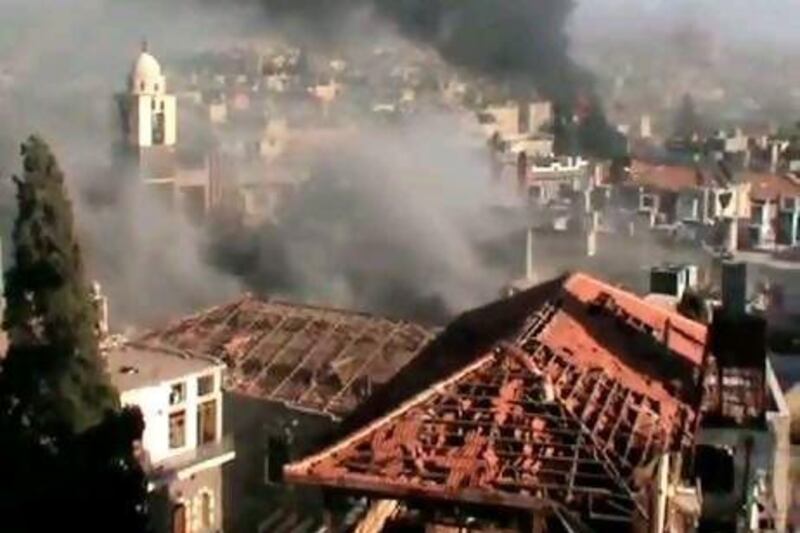BEIRUT // Kofi Annan, the United Nations-Arab League special envoy to Syria said yesterday he was "gravely concerned" about the latest violence there, citing shelling of opposition areas in Homs and reports of mortar, helicopter and tank attacks near the coast.
Mr Annan said there was an escalation of fighting by government and opposition forces.
Violence has increased in recent weeks, with both sides ignoring a ceasefire brokered by the United Nations that was supposed to go into effect on April 12 but never took hold.
Mr Annan demanded both sides "take all steps to ensure that civilians are not harmed."
Activists yesterday said Syrian troops attacked a rebel-held town with helicopter gunships and shelled other areas across the nation. The aerial assault targeted the strategic river crossing town of Rastan, which has resisted repeated government offensives for months, the activists said.
"The regime is now using helicopters more after its ground troops suffered major losses," said Rami Abdul-Rahman of the Britain-based activist group Syrian Observatory for Human Rights, which uses a network of sources on the ground.
The Syrian foreign ministry spokesman, Jihad Makdissi, recently said that rebels were now using sophisticated anti-tank missiles. Videos posted by activists over the past week have shown many destroyed tanks and armoured personnel carriers.
According to videos posted online, fireballs of orange flame and black rubble exploded in the air as waves of shells pounded residential buildings in Homs yesterday. The sounds of shells whooshed through the sky and there was machine-gun fire. The videos could not be independently verified.
The human-rights agency and another activist coalition, the Local Coordination Committees, also reported government shelling in the provinces of Hama and Homs, where Rastan is located, as well as the southern region of Deraa, the province of Aleppo, and suburbs of Damascus and Deir el-Zour.
The Syrian Observatory for Human Rights also said a bomb targeted a security force in the city of Idlib, killing seven soldiers and a civilian. There was no immediate confirmation from state media.
In Damascus, the state-run news agency, Sana, said authorities foiled a bid to blow up a car rigged with 700 kilograms of explosives.
Syrian activists say 13,000 people have been killed in violence since the uprising began in March last year.
The bloodshed has led to broad condemnation of the regime from the international community, although Russia, Iran and China have stood by president Bashar Al Assad. Russia and China have vetoed two Security Council resolutions that threatened sanctions against Syria.
Russia has refused to support any move that could lead to foreign intervention in Syria, Moscow's last significant ally in the Middle East.
The Russian foreign minister, Sergey Lavrov, is scheduled to visit Syria's ally, Iran, tomorrow.
In Germany, the country's defence minister sharply rejected the idea of military intervention in Syria, referring to those who ask for it as "coffee-house intellectuals."
Thomas de Maiziere told yesterday's edition of the newspaper taz: "The continued waffling by people who bear none of the responsibility creates expectations in regions like Syria, thereby causing terrible disappointment."
* Associated Press





